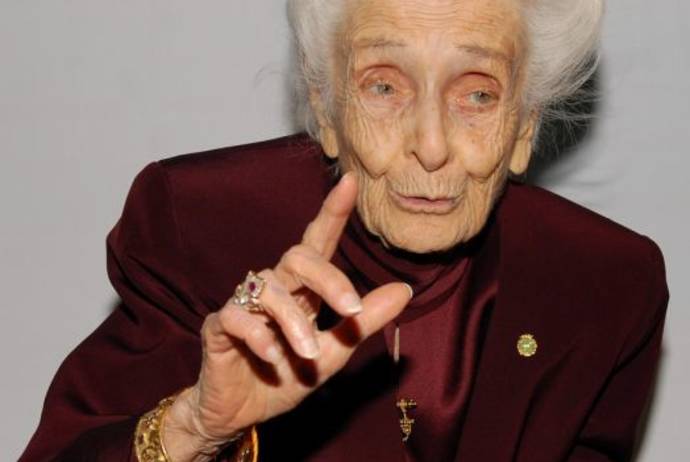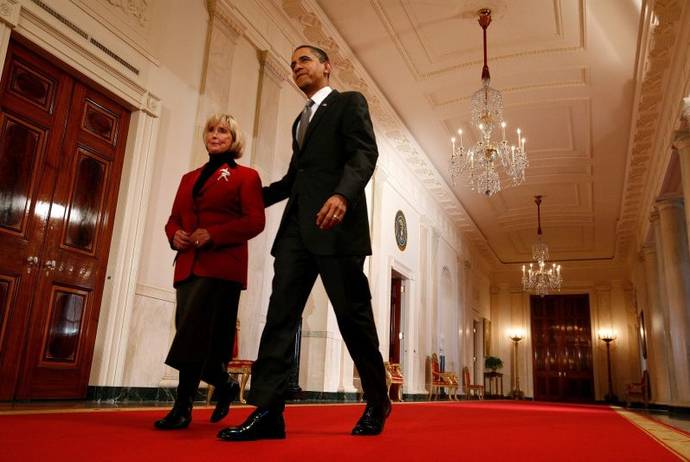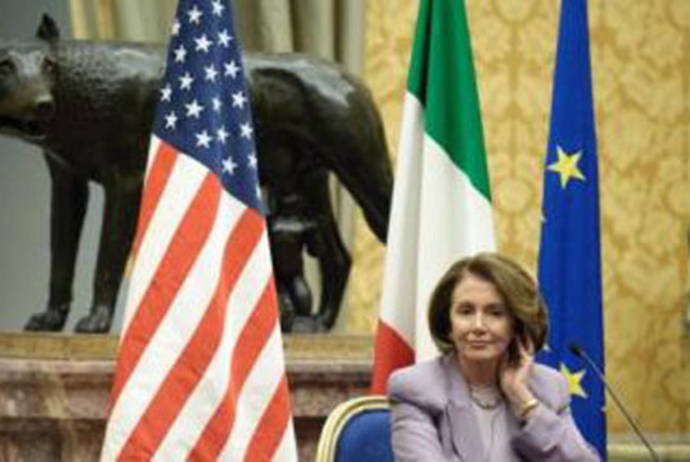The warning of UN High Commissioner for Refugees in Italy is clear: if its policy of towing migrant boats back to the Libyan coast continues, it will be in violation of international laws. The Italian government has given Libya three patrol boats as part of a deal aimed at combating the flow of illegal migrants making the crossing to Italy. The agreement between Tripoli and Rome to maintain joint naval patrols in the Mediterranean was signed earlier this month. Prime Minister Silvio Berlusconi will ignore the warning and proceed with a series of laws aimed to block the flood of migrants from Africa. On May 13, the right-wing Italian government, already under fire for sending several boats back to Libya, voted to impose stiff new penalties by
punishing illegal immigrants with a fine up to 10,000 Euro ($13,670), and the who aid them will be liable for up to three months in jail. The bill also increases the period of detention for the identification of illegal immigrants from two months to six. Laurens Jolles, UNHCR’s representative in Italy, met Interior Minister Roberto Maroni to complain about the practice of deporting migrants intercepted at sea.
Jolles said in a statement after the meeting that such repatriations contradicted the Geneva Convention of 1951. UNHCR says the hundreds of people deported in recent weeks included asylum-seekers, and it calls on Italy to take them back. Roberto Maroni confirmed that the repatriations will go ahead, as provided in the agreement between Libya and Italy. UNHCR said that almost 70% of 31,200 asylum requests in Italy last year came from immigrants who arrived on its southern shores.
Last week several boats were returned in a few days, with hundreds of desperate, clandestine migrants ferried to Tripoli by the Italian navy. The ANSA news agency said the latest batch included two babies and about 50 women.
Inevitably, Rome’s hard-line stance stirred up reactions by human rights and humanitarian organizations, from the UNHCR, as well as from the Vatican and Italian and foreign politicians. UNHCR spokesperson Laura Boldrini said on Friday that “the migrants were unable to make any demands for asylum because they weren't even received.”
The Vatican’s Osservatore Romano newspaper said Rome’s “obligation” was to help those “in desperate straits.” It also said it was “worrisome” that the migrants were not able to request political asylum. Monsignor Agostino Marchetto, the Vatican’s top official for migrant issues, said that sending the migrants back to Libya “violated international rules on refugee rights.” The European Commission said on Friday that it needed more details before it could decide whether Italy’s decision to send the immigrants back to Libya respected European Union laws. “We do want to know what is going on. At this stage we don’t have any details but we are going to monitor the situation,” a justice affairs spokesman for the commission said.
Italy’s President Giorgio Napolitano also gave his opinion on Friday when he warned of an increase in intolerance towards immigrants in Italy. The president, whose role is largely symbolic, said increases in migrant smuggling “risked creating a diffused perception of insecurity and worrisome instances of intolerance” and cautioned against a “rhetoric that does not hesitate to incorporate intolerant and xenophobic tones.”
On Saturday Prime Minister Silvio Berlusconi defended the policy of his government, saying it “conforms to European standards, international laws, and conventions concerning human rights that we have not violated.” The Italian premier made immigration and security his main platform in last year’s political election and seems to be repeating this strategy for the EU’s next elections in June as well. Beside the immigration package making irregular immigration a crime, the parliament is also deciding to legalize “citizens’ patrols” in cities to assist police in hunting and reporting any “illegal activities” perpetrated by immigrants. Silvio Berlusconi said that previous left-wing governments had “opened the doors to clandestine migrants coming from other countries, with an idea of a multi-ethnic Italy,” but that kind of society was “not our idea”, he added, trying to reassure all those Italians who are alarmed at the number of immigrants pouring into the country, particularly from Eastern Europe and Africa.
Mr Berlusconi’s affirmations, which made headlines in Italian newspapers, were welcomed enthusiastically by the Northern League, which sees unchecked immigration as a threat to Italy. “This underscores a revolutionary change from the past,” said the Northern League representative Roberto Calderoli, recommending honorary party membership for Silvio Berlusconi. “Once upon a time there were just a few of us defending Italian identity, but now with the Prime Minister’s words we are in the majority,” Defense Minister Ignazio La Russa said. He also added during an electoral meeting in Milan that the UNHRC “it’s not worth a fig” – not a particularly diplomatic statement which was awkwardly corrected a few hours later.
Among the many legal proposals aimed at tightening the screw on clandestine immigration, there is one striking proposal by Matteo Salvini, an Italian deputy from the Northern League party. His idea sparked the already “hot” political debate after he said that a certain number of seats on public transportation in his constituency of Milan should be reserved for Italians only, like those reserved for women and the handicapped, “because soon, if immigration does not stop, [local Italians] will become a minority to protect.” After condemnation from representatives of both the right and left, Matteo Salvini had to somehow backtrack and rectify his words, which he characterized as “a joke, a provocation.” The left-wing opposition compared the new direction in the right-wing government to the racial purity laws introduced in Italy in the 1920s by Benito Mussolini’s Fascist regime.
And what about the Italians? Are they agreeing with this new pre-electoral development in Berlusconi’s politics? Last week, during the TV program Ballarò, the authoritative pollster Nando Pagnoncelli said that 65% of Italians approve of the government’s bill on immigration, while 58% agree that clandestine immigration should be considered a crime. 59% think that it is right for a public officer to report an illegal immigrant.
The Vatican’s position inspired me to go outside of a church just to see if Catholic opinions agree with the church’s position. Of course, I also asked ordinary people who were passing by. Concetta, 73, housewife, coming out after morning mass, approves of the government’s new politics: “There are already so many Italian delinquents, why should we also take those from abroad?”
Her friend Elsa, 80, adds: “They arrive here, they don’t have a job, and then decide to steal to survive. They should steal in their own countries! We are tired of accepting all these people!”
Stefano, 55, works in a supermarket right in front of the church: “The point is,” he says,
“that when Italians are abroad they have to be very careful in terms of their behavior, while the immigrants here are aware that they can do whatever they wish without any police intervention. I can’t dare to imagine what will happen in our cities when there are 10 or 15 million immigrants.”
Luigi, 47, school custodian, agrees: “After all, the law is a good thing because it follows the rules of Mother Nature and natural selection. The strongest ethnic groups survive, and the weak ones are destined to be extinct.”
Carolina, 23, student, volunteer, and girl scout at that church tells me that she feels so sorry while watching on TV the boats full of desperate people who are rejected by our country. “Though,” she added, “there is a deep intolerance of immigrants in the public opinion, and not only among old people. I’ve noticed,” she concluded, “that this sentiment is also prevalent among the younger generations who believe the stereotypes that all immigrants are drug dealers, thieves, or criminals.”
The polls and the opinions of common people clearly reflect a sense of hostility and, in some cases, indifference towards issues that are apparently far away, such as civil wars and the persecution of dissidents in other countries. Sometimes, though, the moment of consciousness arrives, as history has demonstrated so many times before.
In 1932, the German poet Bertolt Brecht wrote words that anticipated with incredible lucidity the tragic events that occurred a few years later – words which should always be a warning to the people of every country:
First they came to pick up the gypsies and I was happy because they pilfered.
Then they came to pick up the Jews and I was silent because they were unpleasant.
Then they came to pick up the homosexuals and I was glad because they were annoying.
Then they came to pick the communists and I didn’t say anything because I was not communist.
Then one day they came to pick me up and nobody was left to protest.
(Edited by Giulia Prestia)




































 Pelosi’s paternal grandfather, Tommaso Fedele D’Alessandro, was born on September 11, 1868 in Montenerodomo near Chieti, Abruzzo. Her grandmother, Maria Petronilla Foppiani, was born in Rovegno near Genova in 1894. Fini also gave Pelosi a photo of Montenerodomo from her grandfather’s time and a letter from the mayor of Rovegno inviting her to visit her grandmother’s birthplace. She expressed her pride as a daughter of Italian immigrants coming back to her parents’ country as the Speaker of the U.S. House of Representatives which is the third most important position in the nation. “There have been so many comments regarding the fact that I am the first woman,” Ms. Pelosi continued, “though I am so proud of being the first Italian-American.”
Pelosi’s paternal grandfather, Tommaso Fedele D’Alessandro, was born on September 11, 1868 in Montenerodomo near Chieti, Abruzzo. Her grandmother, Maria Petronilla Foppiani, was born in Rovegno near Genova in 1894. Fini also gave Pelosi a photo of Montenerodomo from her grandfather’s time and a letter from the mayor of Rovegno inviting her to visit her grandmother’s birthplace. She expressed her pride as a daughter of Italian immigrants coming back to her parents’ country as the Speaker of the U.S. House of Representatives which is the third most important position in the nation. “There have been so many comments regarding the fact that I am the first woman,” Ms. Pelosi continued, “though I am so proud of being the first Italian-American.” 


 apparently, is also appreciated by readers. Included is an interview with Italian president Giorgio Napolitano, who admired Obama’s words: “The moral leadership of the USA is coming back again”. The political philosopher Paul Berman noted that “It was an appeal to the spirit of the nation”. There was also news of Wall Street’s further decline, dropping 4%, an event that had never occurred on Inauguration Day
apparently, is also appreciated by readers. Included is an interview with Italian president Giorgio Napolitano, who admired Obama’s words: “The moral leadership of the USA is coming back again”. The political philosopher Paul Berman noted that “It was an appeal to the spirit of the nation”. There was also news of Wall Street’s further decline, dropping 4%, an event that had never occurred on Inauguration Day  eet were conspicuously absent elements in “the crowning of the first black president”. The editor, Mario Giordano, rather sarcastically asks, after having heard the speech: “Is that all, dear Barack?” And in his editorial Giordano shares that he is unable to be moved by what happened in the United States. “I hear opinion-makers talking about a global turning point –he continues- about an epochal event, I’ve witnessed the euphoric attitude shown by ministers attending the fashion parades, and unfortunately I am unable to feel part of all this. I am sorry. All I can see are traces of honest rhetoric, some sparks of vigor and a handful of good feelings. We can and ‘volemose bene’ (that is an exhortation to love each other in the Roman dialect, used in a sarcastic way, ndr).”
eet were conspicuously absent elements in “the crowning of the first black president”. The editor, Mario Giordano, rather sarcastically asks, after having heard the speech: “Is that all, dear Barack?” And in his editorial Giordano shares that he is unable to be moved by what happened in the United States. “I hear opinion-makers talking about a global turning point –he continues- about an epochal event, I’ve witnessed the euphoric attitude shown by ministers attending the fashion parades, and unfortunately I am unable to feel part of all this. I am sorry. All I can see are traces of honest rhetoric, some sparks of vigor and a handful of good feelings. We can and ‘volemose bene’ (that is an exhortation to love each other in the Roman dialect, used in a sarcastic way, ndr).”  dicated to the President’s oath on Canale 5, one of the premier’s networks, then shortly afterward, supposed audience favorites such as Big Brother, Who Wants to be a Millionaire, and local crime news returned to the airwaves—evidently they are a priority compared with the Inauguration of the first African-American President in the history of the United States. This attitude is rather inexplicable when other moments like, for instance, the press conferences of Premier Silvio Berlusconi, are given considerable space—and sometimes are even shown twice, at different times, to give another chance to those who had the misfortune of missing them the first time.
dicated to the President’s oath on Canale 5, one of the premier’s networks, then shortly afterward, supposed audience favorites such as Big Brother, Who Wants to be a Millionaire, and local crime news returned to the airwaves—evidently they are a priority compared with the Inauguration of the first African-American President in the history of the United States. This attitude is rather inexplicable when other moments like, for instance, the press conferences of Premier Silvio Berlusconi, are given considerable space—and sometimes are even shown twice, at different times, to give another chance to those who had the misfortune of missing them the first time.